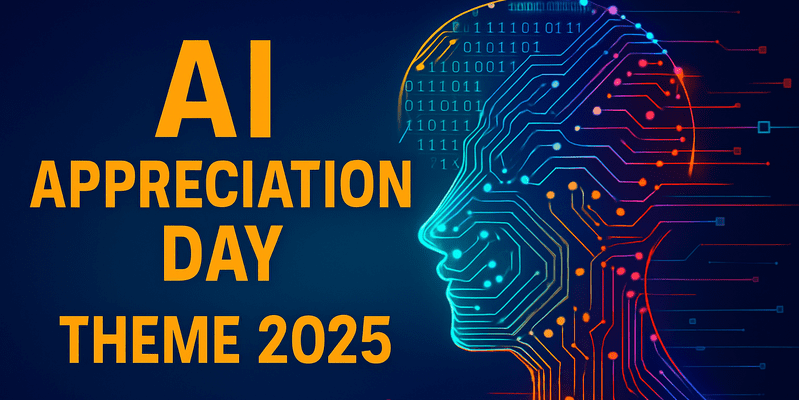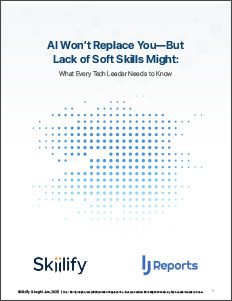AI Appreciation Day Theme 2025: Your Fastest-Growing Colleague

Tim King offers a 2025 AI Appreciation Day theme from over 130+ experts that reveals how enterprise tech leaders view the human impact of AI.
AI Appreciation Day 2025 revealed a powerful truth: artificial intelligence has outgrown its role as a tool. It is now, indisputably, your fastest-growing colleague—embedded, autonomous, and evolving faster than most enterprises can plan for. This shift is more than technological—it is organizational, operational, and deeply human.
Over the past year, leaders across the enterprise have moved from curiosity to confrontation—from asking what AI can do to grappling with what AI will change. With this transition comes a spectrum of responses: optimism, resistance, experimentation, and anxiety. It mirrors what many are now calling the AI Stages of Grief, a term we’ve coined to describe the emotional and strategic reckoning business leaders face as AI disrupts not just processes, but professional identities.
In conversations with more than 130 enterprise tech leaders, a deeper theme emerged: AI isn’t simply automating tasks—it’s demanding that we reimagine our relationship with work. It challenges us to cultivate power skills like adaptability, judgment, and creativity—the very soft skills AI can’t replace—in order to lead and collaborate in this new hybrid landscape of human-machine teams.

These aren’t philosophical musings. They’re the practical takeaways drawn from the stories, strategies, and hard-won insights of over 130 CIOs, CTOs, CMOs, and data leaders. From those conversations, five transformational themes emerged. Together, they reveal how AI is no longer just accelerating productivity—it’s redefining what it means to be a modern enterprise.
Important: AI Won’t Replace You, But Lack of Soft Skills Might – Get Report
AI Appreciation Day Theme 2025
AI as a Force Multiplier, Not a Replacement
Enterprise leaders are aligned: AI isn’t coming for your job—it’s clearing the path so you can do it better. From finance and product marketing to cybersecurity and logistics, AI is absorbing low-value, repetitive tasks and surfacing meaningful insights that allow human teams to focus on judgment, strategy, and creativity. In this new dynamic, AI acts as the ever-alert co-worker—relentlessly efficient, but never emotionally intelligent. What makes teams exceptional—empathy, nuance, vision—remains uniquely human, and AI is helping those traits rise to the surface.
“AI isn’t here to replace our team but to amplify what makes us exceptional… It smooths out our workflows, cuts the busywork, and frees us up to focus on building trust and growing the brand.”
— Todd Ariss, Founder and CEO, GoDark Bags
AI doesn’t eliminate the human—it elevates it.
The Rise of Agentic AI and Autonomous Decision-Making
AI has evolved from a passive assistant to an active operator. Leaders from SaaS, supply chain, and professional services report real-world results as agentic AI begins executing workflows, managing logic chains, and making context-aware decisions at scale. This leap—from models that generate to agents that act—means AI is not just embedded in your business but directing parts of it. The challenge now isn’t whether AI can act autonomously, but whether your governance frameworks can keep pace with its acceleration.
“Agentic AI is the most transformative addition. Autonomous digital workers can create a hybrid workforce that blends AI with human teams.”
— Raju Malhotra, Chief Product and Technology Officer, Certinia
AI is no longer suggesting what’s next—it’s already doing it. Are you ready to collaborate with your digital coworkers?
Human-in-the-Loop Isn’t Just Best Practice—It’s Imperative
Speed without oversight is risk. As AI systems become more capable, enterprises must hard-code human responsibility into the loop—through real-time monitoring, explainability, and auditability. Identity, access, and security experts are especially vocal: AI systems that act autonomously without transparent control mechanisms become threats, not tools. Human oversight is not a speed bump—it’s a steering wheel. Without it, AI systems may optimize for the wrong objective, amplify bias, or undermine trust in seconds.
“AI is becoming the pilot, not the co-pilot. But without a control tower, even the smartest flight crashes. Identity is that tower—our fuse box, our failsafe.”
— Roy Akerman, VP of Identity Security Strategy, Silverfort
Trustworthy AI is governed AI. The human touch is your safety system.
Data Infrastructure Is the Unseen Enabler
Behind every high-performing AI is a data foundation, either powering it or breaking it. From generative AI hallucinations to failed implementations, the underlying problem often comes down to poor, fragmented, or biased data. Leaders emphasized the need for unified, governed, and real-time data pipelines capable of feeding AI systems at scale with precision. AI can’t think clearly if it’s learning from noise. And most organizations, they admit, are still playing catch-up.
“AI’s potential is thrilling, but its promise can only be realized when built on a solid foundation of trusted, high-quality data.”
— Nick Burling, SVP of Product, Nasuni
The smartest AI is useless without clean, connected, and compliant data. Fix the foundation first.
Cultural Adaptation Is the Real Competitive Edge
Technology moves fast—but culture determines whether you thrive or stall. As AI permeates every workflow, leaders are finding that resistance often comes not from the tech, but from the team. Successful organizations are retraining not just models, but mindsets—building AI readiness through upskilling, trust-building, and an intentional shift toward empathetic AI integration. The winners in this era will be those who see AI as a catalyst to elevate their people, not displace them.
“Teaching people how to collaborate with AI is as critical as deploying it, and that is how we will truly reinvent how work gets done.”
— Munu Gandhi, EVP, President, Xerox IT Solutions
AI maturity is cultural. People-first adaptation is your long-term advantage.
The Takeaway
AI has crossed the threshold from support system to strategic partner. Its velocity, versatility, and visibility demand more than admiration—they demand action. Whether you’re building agentic systems or rethinking your workforce strategy, the challenge in 2025 isn’t just to adopt AI—it’s to co-evolve along with it.
Read Solutions Review‘s AI Appreciation Day 2025 Commentary from over 130 Experts here.
Note: These insights were informed through web research and generative AI tools. Solutions Review editors use a multi-prompt approach and model overlay to optimize content for relevance and utility.



